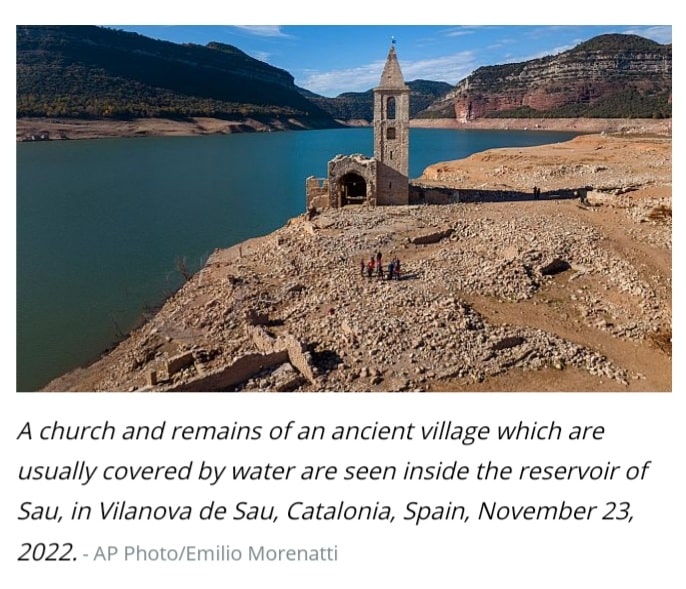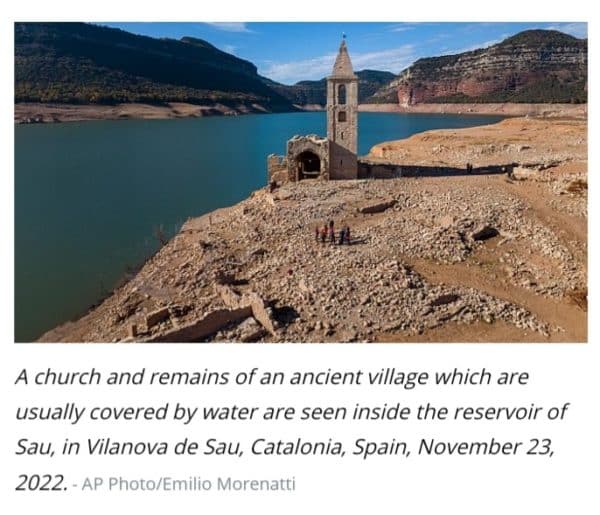Spain could face a drought this winter following the unprecedented temperatures that have been recorded – as the hot weather continued throughout November.
In the Costa Blanca region in November temperatures this year has seen a significant increase, with 27.9 degrees recorded within the Vega Baja.
In Catalan authorities imposed a plethora of water restrictions on November 25 – following Spain enduring the longest drought since records began.
Under the new rules, pools cannot be re-filled, showers are limited to five minutes, many municipal fountains have been turned off, cars cannot be cleaned, and gardens can only be washed two days a week.
Private water companies will alert authorities if households are using too much water.
Drinking water
Drinking water has not been cut, for the time being, but authorities may have to impose more restrictions in Barcelona and more than 500 towns in the northeastern region – if rainfall doesn’t arrive.
Barcelona is the second area in Spain to impose water restrictions, after Seville cut water supplies in September when temperatures hit 47 degrees Celsius near Cordoba in southern Spain.
Drought
The parched Mediterranean nation has experienced the longest-running drought since records began in 1961, according to AEMET, the Spanish meteorological agency.
Catalonia’s reservoirs are down to 34% of capacity, according to Spain’s ministry for ecological transition.
At the Sau reservoir 100 kilometres north of Barcelona, the water has fallen to 18% of capacity with the 10th-century San Pau church – submerged in 1962 on the orders of the Spanish dictator, General Francisco Franco – has emerged from the depths.
Kayaking and canoeing that attracted visitors now see them arrive from Barcelona to take photos outside the church, which is fully visible.
“People are now just coming here to have their photographs taken so I decided to close the kayaking in September. There was not enough water and there was so much mud it was not good,” said Sebastian Parès, owner of Kayak Sau.
“It has not been a good year and even if it rains next year probably will not be much better. It is a worry.
“We have survived, despite the drought, because it offers other activities like electric biking,” he said.
In Barcelona, at the cut-price BonArea garage, there is normally a queue of drivers waiting to fill their cars with cheaper fuel, amid the cost-of-living crisis increasing petrol prices.
In late November people were queuing to wash cars – before a ban came into force.
“It is the last time we can do this before these restrictions come in. Who knows how long this will be before there is some rain here?”, said María Barros.
Under the new regulations, pool owners in Barcelona cannot refill their pools.
Gardens
Homeowners can only water their gardens twice a week. Streets cannot be washed with drinking water, with farmers and industrial companies having had water supplies reduced by 25%.
Patricia Plaja, a spokeswoman for the Catalan regional government, said: “It will not be necessary to limit water use for homes for washing, drinking or cooking.
“Be aware of the exceptional situation the country is facing. The climate context that Catalonia will suffer longer and more frequent droughts.”
Nearly half of all the public fountains in Barcelona will be turned off.
The Magic Fountain, whose waters are coloured at night while classical music is played, remains unaffected at present.
The taps were turned off for the ornamental fountain in Paseo de Gracía, Barcelona’s upmarket shopping street where Gucci, Chanel and Prada compete for the attention of tourists fresh off cruises.
In 2008, a prolonged drought forced Spanish authorities to bring in water to Barcelona, via boat to guarantee domestic use.
This water crisis prompted the building of a desalination plant near Barcelona which Catalan authorities said is the largest in Europe with a capacity to produce 60 hm3 in a year. It is now running at 90% capacity, authorities said.
Climate scientists have identified the Mediterranean as one of the world’s regions that will suffer the most from increasing temperatures due to climate change.
Unless there is substantial rainfall during the winter, farmers will struggle to grow crops, according to the Catalan Water Agency, which said they could be faced with trying to irrigate crops next summer with hardly any water.
Water irrigation consumes about 70% of the water supply, according to Unesco, the UN body.
Data records in the Costa Blanca for November state that it is normally one of the coldest and wettest months.
The average temperature for the Costa Blanca in December is 17 degrees according to data.
The Costa Blanca and Costa Calida await with abated breath as to whether they will face similar bans to that of Cataluyna and Barcelona this winter.






















